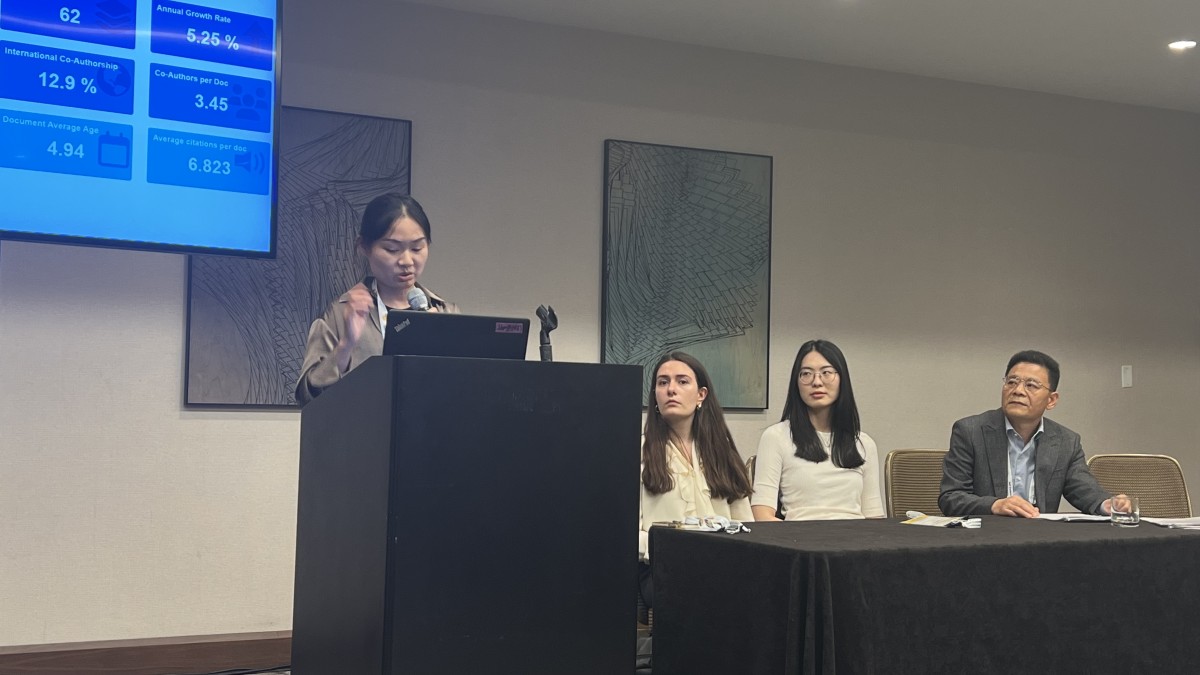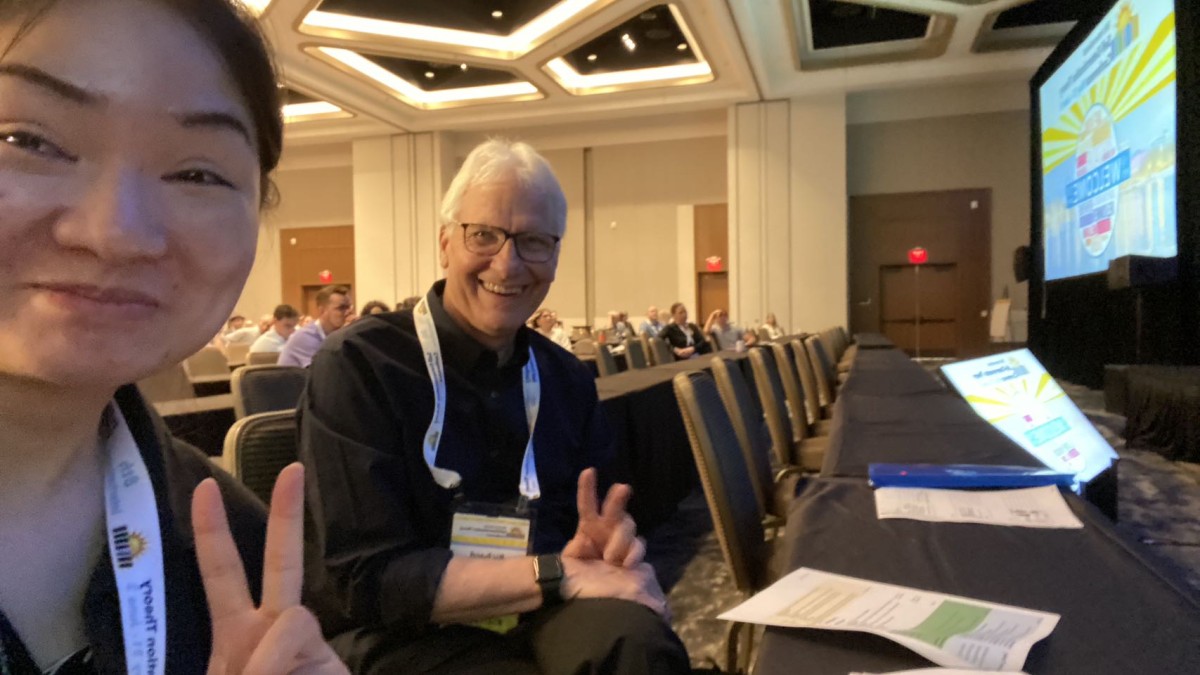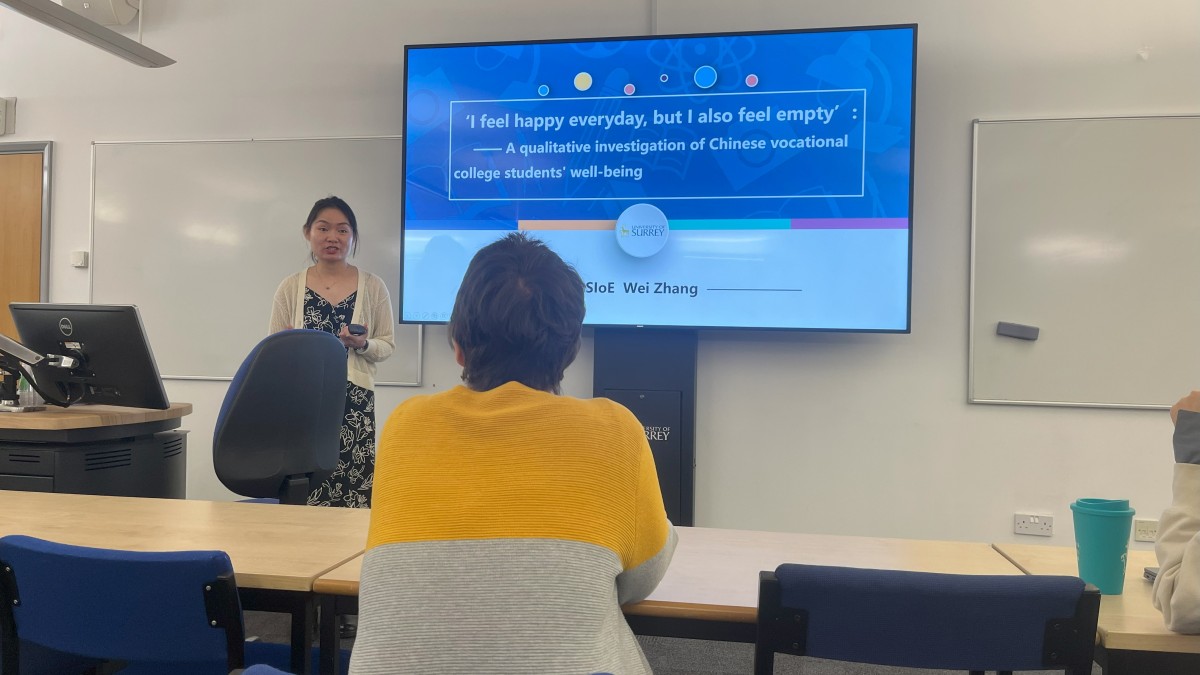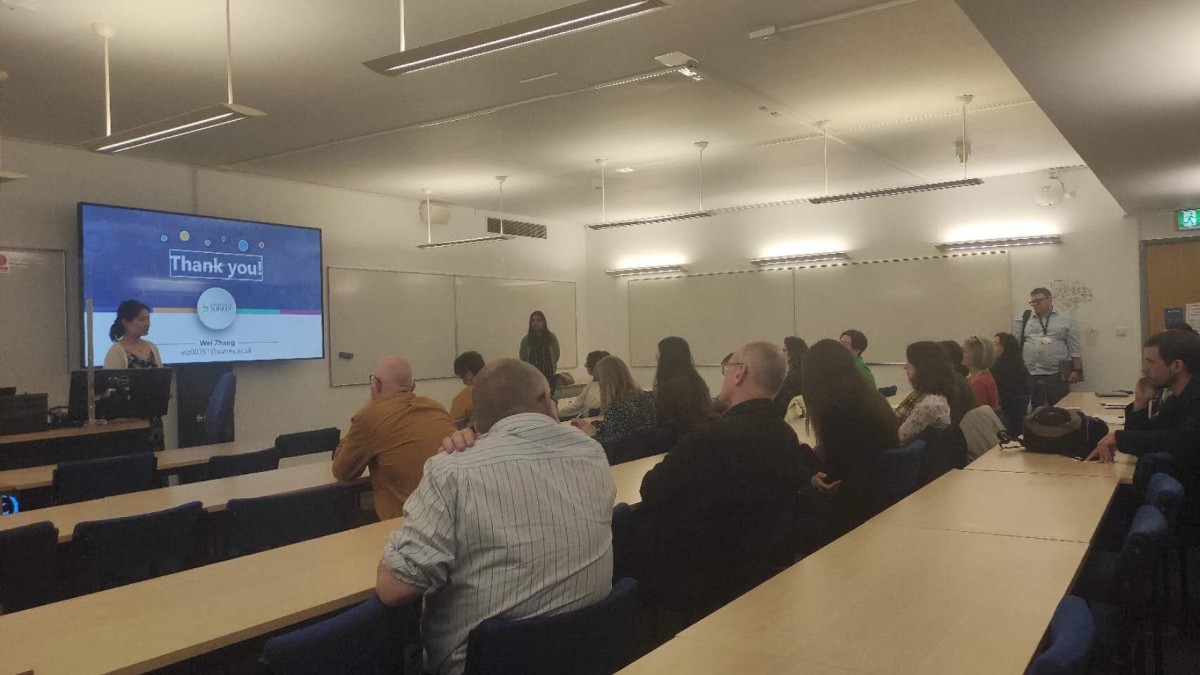Dr Wei Zhang
About
My research project
GOALS AND MOTIVATION: A STUDY INVESTIGATING THE WELL-BEING OF HIGHER VOCATIONAL EDUCATION STUDENTS IN CHINAWell-being has attracted significant attention from educational researchers, particularly regarding Higher Vocational Education (HVE) students, who are expected to become skilled professionals contributing to national development. Chinese HVE students often face academic pressure from parents, teachers, and peers due to their failure to enter academic universities, leading to decreased motivation and mental health issues. Given the benefits of higher well-being, such as increased school engagement and better work performance, this thesis explores how the well-being of Chinese HVE students is perceived, influenced, and enhanced through their goals and motivation, as explored across three studies addressing four research questions. A mixed methods approach was adopted with pragmatism as the guiding epistemological stance. Study 1 explored HVE students’ and tutors’ perceptions of well-being, revealing an emphasis on hedonic well-being and a lack of eudaimonic well-being. Furthermore, goals and motivation were perceived as influential factors in HVE students’ well-being. Study 2 investigated the relationships between well-being, goals, and motivation, finding that motivation played a dual role (i.e. moderator and mediator) in shaping the effect of goals on well-being. Study 3 conducted a goal-setting intervention aimed at enhancing HVE students’ well-being, along with a follow-up interview to explore the effectiveness of the intervention. It found that the goal-setting intervention did not increase HVE students’ overall well-being, but it did increase their engagement with goal pursuit and feelings of loneliness. Additionally, multiple influencing factors were found to impact the effectiveness of the intervention. The research findings contribute to existing theories and literature by improving knowledge of HVE students’ well-being as well as providing insight into the relationships between students’ well-being, goals, and motivation. Moreover, implications are provided with recommendations for policymakers, HVE institutes, tutors, and students.
Supervisors
Well-being has attracted significant attention from educational researchers, particularly regarding Higher Vocational Education (HVE) students, who are expected to become skilled professionals contributing to national development. Chinese HVE students often face academic pressure from parents, teachers, and peers due to their failure to enter academic universities, leading to decreased motivation and mental health issues. Given the benefits of higher well-being, such as increased school engagement and better work performance, this thesis explores how the well-being of Chinese HVE students is perceived, influenced, and enhanced through their goals and motivation, as explored across three studies addressing four research questions. A mixed methods approach was adopted with pragmatism as the guiding epistemological stance. Study 1 explored HVE students’ and tutors’ perceptions of well-being, revealing an emphasis on hedonic well-being and a lack of eudaimonic well-being. Furthermore, goals and motivation were perceived as influential factors in HVE students’ well-being. Study 2 investigated the relationships between well-being, goals, and motivation, finding that motivation played a dual role (i.e. moderator and mediator) in shaping the effect of goals on well-being. Study 3 conducted a goal-setting intervention aimed at enhancing HVE students’ well-being, along with a follow-up interview to explore the effectiveness of the intervention. It found that the goal-setting intervention did not increase HVE students’ overall well-being, but it did increase their engagement with goal pursuit and feelings of loneliness. Additionally, multiple influencing factors were found to impact the effectiveness of the intervention. The research findings contribute to existing theories and literature by improving knowledge of HVE students’ well-being as well as providing insight into the relationships between students’ well-being, goals, and motivation. Moreover, implications are provided with recommendations for policymakers, HVE institutes, tutors, and students.
News
In the media
8th SDT conference
Presentation at PGR-symposium
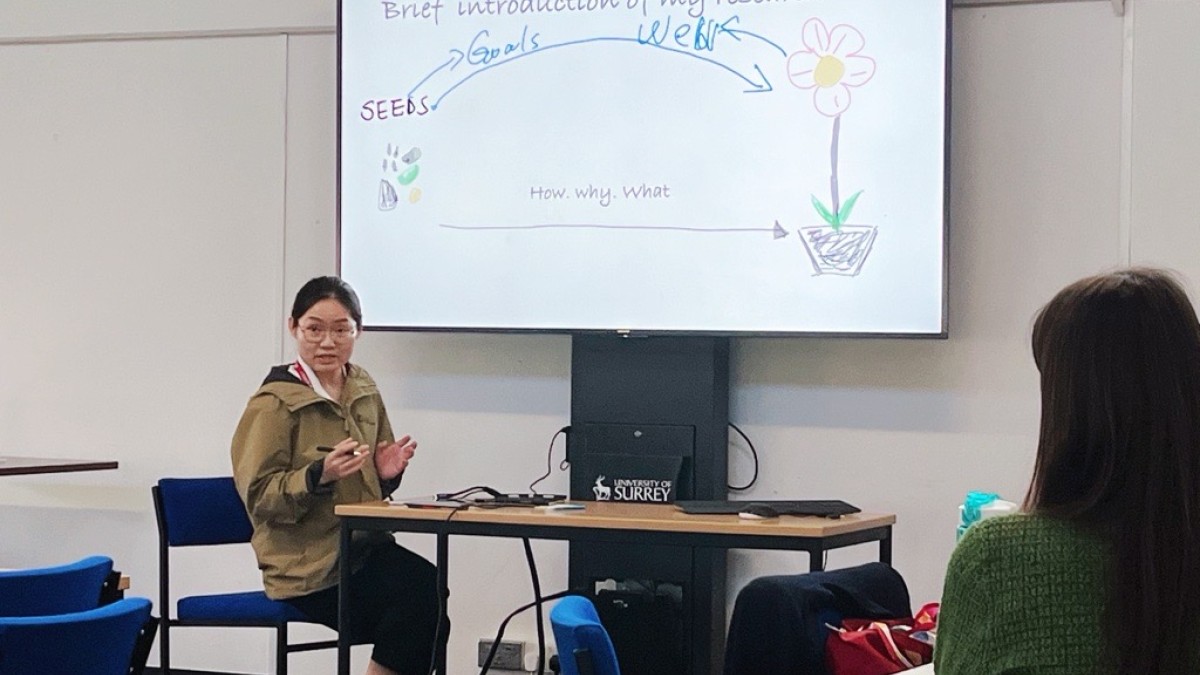
University of Surrey’s Race Equity Conference
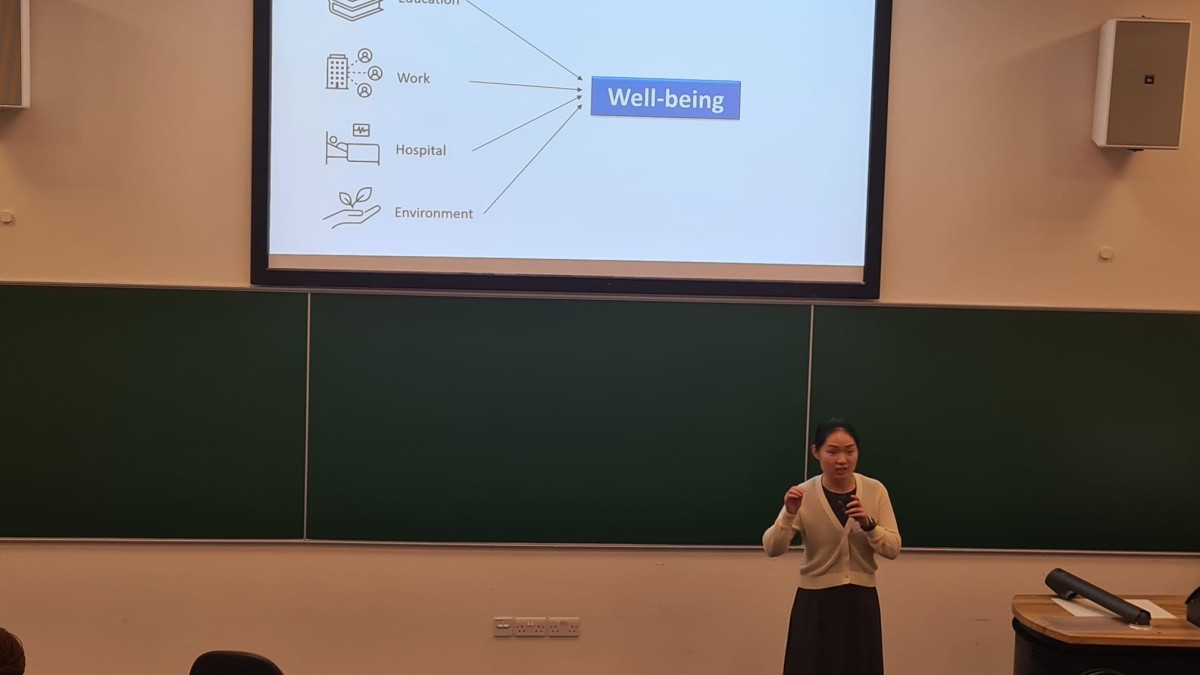
ResearchResearch interests
Well-being; Motivation; Goals.
Educational Psychology.
2023 Excites
Research interests
Well-being; Motivation; Goals.
Educational Psychology.
2023 Excites
Publications
•Flexible Zn-ion battery-powered PANI IR-ECDs with superior modulation properties are developed.•High Δε of 0.56 at 8‒14 μm and significant radiative temperature modulation of 10.9 °C are achieved at ~40 °C.•The device exhibits an extremely low Δε decay rate of 0.0145 % per cycle after 120,000 s continuous cycling.•Multifunctionalities such as self-powering, solar modulation compatibility, and multi-spectral camouflage are demonstrated. Electrochromic devices (ECDs) capable of modulating infrared emission hold great potential in many application fields, including energy harvesting and conservation, sustainable building technology, thermal imaging, and spacecraft thermal control. However, its wider implementation requires the development of innovative strategies to achieve high modulation ratio, high flexibility, low cost, and seamless integration capabilities. Here we present a low-cost, large-area-compatible, solution-process approach for flexible infrared ECDs (IR-ECDs) by designing gradient porous membrane-supported polyaniline (PANI) composite structures. These devices achieve a superior emissivity variation (Δε) of 0.56 across the critical atmospheric transparency window of 8–14, coupled with a large modulation of radiative temperature by 10.9 °C at 40 °C environmental conditions. Remarkably, they retain a high Δε even after 120,000 s of continuous operation, demonstrating exceptional cycling durability with a minimal emissivity decay rate of 0.0145 % per cycle. Furthermore, we demonstrate that the flexible, self-powered IR-ECDs are able to support continuous modulation operation for an impressive duration of circa 20 years for a large device with an area of 1 m2, consuming a minimal 1-kilowatt hour (kWh) of electricity. This development paves the way for new, high-efficiency strategies in preparing and deploying high-performance adaptive energy-management applications.
Analyzing 28 articles from databases including WOS, Scopus, and ProQuest, this systematic review investigates the application of Hofstede’s cultural dimensions theory in education. It reveals a sustained scholarly interest in cultural dimensions with substantial contributions from scholars in China, Japan, Israel, and the UK. The study focuses on the impact of cultural dimensions on educational management and their influence on teaching and learning behaviors. Significant findings indicate that key dimensions—power distance, individualism versus collectivism, and long-term orientation—affect educational management behaviors, leadership practices behaviors, teaching and learning behaviors. The review emphasizes the necessity of cultural sensitivity in educational practices and policies, advising educators and policymakers to adapt their approaches to diverse cultural contexts. While offering valuable insights into the development of culturally sensitive educational strategies in the context of globalization, the review also acknowledges limitations such as publication bias and calls for more empirical research.
Students' well-being has received increasing international attention. However, research on well-being among higher vocational education (HVE) students, particularly in non-WEIRD contexts, remains limited. This study addresses this gap by investigating the relationships between goals, motivation, and well-being for HVE students in China through the lens of self-determination theory. A survey was administered to 1106 HVE students at a vocational college in China to collect data on their goal content, motivation, and well-being. Quantitative analyses revealed that motivation plays a dual role, acting as both a mediator and a moderator in the relationship between goals and well-being. This dual role is crucial for understanding not only how goals influence well-being but also under what conditions different types of goals promote or hinder well-being. Specifically, intrinsic goals, when paired with autonomous motivation, were found to significantly predict increased well-being. While extrinsic goals combined with controlled motivation also reliably predicted well-being, this relationship should be interpreted cautiously within the specific cultural context of the study. Furthermore, positive relationships between extrinsic goals and well-being, as well as between amotivation and well-being, were observed, contrasting findings from 'WEIRD' contexts. This study provides novel insights into how motivation functions as both a moderator and mediator in the goal-well-being relationship within a 'non-WEIRD,' specifically Chinese, HVE context. These findings underscore the importance of supporting students in pursuing goals to enhance their well-being. Further research is needed to explore these relationships in diverse cultural settings.
This study aims to identify the conceptualisation of overall well-being used for well-being assessment through a review of the characteristics and key components and/or dimensions of well-being scales as presented in current literature. Scopus and Web of Science were searched, and thematic analysis was conducted inductively to analyse the identified components within scales, as well as the types of well-being these scales measure. 107 peer-reviewed articles from 2003 to 2022 were included, and 69 well-being scales were identified covering nine areas of well-being. Four final themes were identified as the foundational dimensions of overall well-being: hedonic; eudaimonic; physical health; and generic happiness. Notably, these 69 scales are mainly validated and adopted in the Western context. '4 + N' frameworks of overall well-being are recommended for assessing overall well-being. This review provides researchers with a synthesis of what types of well-being have been measured and which measures have been used to assess these types of well-being for which research participants. Non-Western-based well-being research is called for that incorporates a broader range of research participants and cultural contexts in contributing to a more inclusive understanding of well-being.
Perovskite solar cells (PSCs) have shown rapid development recently, whereas nonideal stability remains the chief obstacle toward commercialization. Thus, it is of utmost importance to probe the degradation pathway for the entire device. Here, the extrinsic stability of inverted PSCs (IPSCs) is investigated by using standard shelf-life testing based on the International Summit on Organic Photovoltaic Stability protocols (ISOS-D-1). During the long-term assessment of 1700 h, the degraded power conversion efficiency is mainly caused by the fill factor (53% retention) and short-circuit current density (71% retention), while the open-circuit voltage still maintains 97% of the initial values. Further absorbance evolution and density functional theory calculations disclose that the perovskite rear-contact side, in particular for the perovskite/fullerene interface, is the predominant degradation pathway. This study contributes to understanding the aging mechanism and enhancing the durability of IPSCs for future applications.
Excited states in the neutron-deficient nucleus Tc-87 have been studied via the fusion-evaporation reaction 54Fe(36Ar, 2n1p) Tc-87 at 115 MeV beam energy. The AGATA gamma-ray spectrometer coupled to the DIAMANT, NEDA, and Neutron Wall detector arrays for light-particle detection was used to measure the prompt coincidence of gamma rays and light particles. Six transitions from the deexcitation of excited states belonging to a new band in Tc-87 were identified by comparing gamma-ray intensities in the spectra gated under different reaction channel selection conditions. The constructed level structure was compared with the shell model and total Routhian surface calculations. The results indicate that the new band structure in 87Tc is built on a spherical configuration, which is different from that assigned to the previously identified oblate yrast rotational band.
China's distinctive educational approach, particularly its emphasis on ideological and political education, has garnered considerable academic attention for its impact on shaping individual values, fostering citizenship, and maintaining social stability. Despite the Chinese government's prioritization of ideological and political education, academic research in this field appears constrained, with existing studies predominantly focusing on normative and descriptive aspects. Normative research delineates how ideological and political education should be executed, while descriptive research illustrates its practical implementation. The effectiveness of these approaches is significantly diminished if they are not adequately interconnected—when only the current reality is explained without providing tools for improvement or when prescribed steps for improvement lack a basis in specific contexts. This paper conducts a comprehensive review of research on ideological and political education using ATLAS. ti 9 for thematic analysis. The review aims to unveil the intricate landscape of current research in China and address key questions: What are the primary trends in the literature on ideological and political education between 2021 and July 2023? What challenges does ideological and political education face? Through a direct exploration of these issues, this paper seeks to optimize the ideological and political education system, elevate its adaptability and effectiveness, and open avenues for research, fostering a more dynamic, inclusive, and resilient development of ideological and political education.
